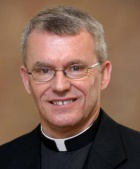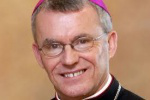Australia: Archbishop asks all who believe in God to pray and fast for Iraq

Archbishop Costelloe
In a document released earlier today to over one hundred parishes in the metropolitan and rural areas of Perth, Archbishop Timothy Costelloe, the Catholic Archbishop of Perth, invites “Catholics, fellow Christian brothers and sisters, and all those who believe in God” to pray to God “to bring about a satisfactory intervention” to the escalating crisis in Iraq.
“The evil and subsequent suffering unfolding in Iraq is not of God's making but is the result of humanity's terrible abuse of God's precious gift of free will,” says the archbishop.
He encourages that people “pray for a change of heart in those who persecute others and that those who are unduly suffering would be given the necessary strength and perseverance to meet their needs in each unique situation”.
The archbishop speaks of “a moral obligation” that we have in the West “to provide sanctuary to those fleeing from their homeland” and he applauds the decision made by France's foreign and interior ministers this week "to help facilitate asylum on [their] territory" and also “the decision made by the Federal Government to open its humanitarian refugee program to as many as 4,000 Iraqi Christians and Yazidis in response to this crisis”.
He echoes words spoken earlier this week by the director-general of the Australian Security Intelligence Organisation (ASIO), David Irvine, that “we are not fighting Islam, in Australia or anywhere else. We are fighting the terrorism that kills innocent people, both Muslim and non-Muslim”.
Archbishop Costelloe encourages Catholics and others who believe in God to pray and fast “not in any burdensome manner but out of a concerned heart and as a way of becoming closer to God” who is the source of peace and love. In laying down some suggested methods of prayer and fasting, the archbishop suggests that this is more about “changing and purifying the nature of our hearts than about trying to force God's hand”.
The archbishop offers an adapted prayer for people to pray written by the Chaldean Catholic Patriarch of Iraq, His Beatitude Louis Rafael Sako.
The entire document sent out to parishes can be found by clicking here: www.perthcatholic.org.au/_uploads/fcknw/files/140814%20Archdiocesan%20Response%20to%20Iraq.pdf
An overview of the document can be found below.
An Archdiocesan Response to the Present Crisis in Iraq
14 August 2014
Background
The Christian communities of Iraq are regarded as one of the oldest surviving continuous Christian communities in the world. The majority are Assyrians with a smaller community being Armenian.
Christians totalled 1.5 million in Iraq in 2003, around 5 percent of the population. A decade later, this number was less than 450,000 with Chaldean Catholics forming the biggest group of Christians.
Some 30,000 Christians are thought to have fled Mosul to Hamdaniya to the east since the city was seized by the Islamic State (IS) militant group, who we are told have been ordering Christians to convert to Islam, pay a tax or face death. The UN are saying that a mere 20 families from the ancient Christian minority possibly remain in Mosul, which IS has taken as the capital of its Islamic state.
We read that an estimated 200,000 people have been forced to flee their homes after jihadist militants took over more towns in northern Iraq.
A humanitarian tragedy is unfolding each day with grave concerns expressed for the physical safety of these civilians, many of whom are now reported as dead.
Our Challenge
In the face of the displacement of the ancient Christian communities of Iraq, we in the West have a moral obligation to provide sanctuary to those fleeing from their homeland. We applaud the decision made by France's foreign and interior ministers this week "to help facilitate asylum on [their] territory" and the decision made by the Federal Government to open its humanitarian refugee program to as many as 4,000 Iraqi Christians and Yazidis in response to this crisis.
Further we need to reflect carefully on the words spoken by the director-general of the Australian Security Intelligence Organisation (ASIO), David Irvine, when he says that “we are not fighting Islam, in Australia or anywhere else. We are fighting the terrorism that kills innocent people, both Muslim and non-Muslim.”
The appalling scenes we have seen in the Media are also condemned by the Australian National Imams Council. Grand Mufti Ibrahim Abu Mohamed has said that it is “utterly deplorable for extremists to use Islam as a cover for their crimes and atrocities” and that “their misguided actions do not represent the overwhelming majority of Muslims”.
Our Part
The Gospel of Matthew (8:5-13) shows us how Jesus, when asked by the centurion to heal his servant who "is suffering greatly" a distance away, recognises the great faith displayed and grants what the centurion believed the Lord could do. As his servant was healed at that moment we too, through the deliberate expression of faith, can dare to believe that God will preserve the lives of our Christian family and of others a great distance away.
I invite Catholics, and any fellow Christian brothers and sisters, and all those who believe in God, to call upon Him in prayer to bring about a satisfactory intervention to this crisis.
The evil and subsequent suffering unfolding in Iraq is not of God's making but is the result of humanity's terrible abuse of God's precious gift of free will. Above all then we must pray for a change of heart in those who persecute others and that those who are unduly suffering would be given the necessary strength and perseverance to meet their needs in each unique situation.
Pope Francis has requested that the Church in Australia respond actively “that the whole Church and all the faithful raise up with one voice a ceaseless prayer, imploring the Holy Spirit to send the gift of peace”.
The Pope also appeals to the consciences of all people, and to each and every believer he repeats: “May the God of peace create in all an authentic desire for dialogue and reconciliation. Violence is not conquered with violence. Violence is conquered with peace? Let us pray in silence, asking for peace, everyone, in silence…” (Angelus, July 20, 2014)
A suggested engagement
Prayer and fasting are ancient Christian ways of expressing the sincerity of our concerns to God. As regards fasting, for a Christian it means to humble oneself before God and is a part of our Christian discipline. It takes on many forms and is not solely about minimising the intake of food. It is much more about changing and purifying the nature of our hearts than about trying to force God's hand. A few suggested forms of fasting are as follows:
Fasting
• for healthy adults, simple bread and water for a day, or as a replacement for a meal
• refrain from eating certain pleasure foods (tea, coffee, or missing desserts or sugary snacks)
• turning off the television for a time to spend time in quiet reflection and prayer
• choosing to serve another person beyond what is expected of us, e.g. going out of our way to assist someone less able than ourselves.
Each individual, family and local church community must decide for themselves how to fast and also how and what to pray, not in any burdensome manner but out of a concerned heart and as a way of becoming closer to God. Prayer can take on numerous forms, some of which are:
Prayer
• Spending time in and with God's Word, reflecting in silence
• Praying the Rosary
• Praying the Divine Mercy Chaplet
• Engaging in a Novena/nine days of prayer (see below)
• Holy Hour before the Blessed Sacrament
• Public or private Litany to the Saints (see below)
We might also consider praying the following adapted prayer written by the
Chaldean Catholic Patriarch of Iraq, His Beatitude Louis Rafael Sako:
Lord,
The plight of Iraq is deep and the suffering of Christians is severe and frightening.
Peace is the foundation of life.
Grant the people of Iraq peace and stability that will enable them to live with one another with dignity and joy.
Spare their lives and grant them patience and courage to continue their witness of Christian values with trust and hope.
We ask this in Jesus' name. Amen.
The Persecuted Church and Religious Freedom
It is estimated that persecution of Christians is presently taking place in 139 nations around the world with four out of five acts of religious discrimination worldwide being directed against Christians. Some in previously moderate or secular countries like Turkey or Egypt have stepped up their hostility.
With horrendous news constantly breaking about the religious persecution happening in Iraq, and with ongoing exposure about threats to religious liberty around the world, we are being encouraged to pray for religious freedom. One way is to consider offering the following novena for this intention. This can be done privately, in a family or community setting, or as part of a Holy Hour offered each day for nine days within a parish setting.
“The saints have always been the source and origin of renewal in the most difficult moments in the Church’s history.” said St. John Paul II. With this in mind, it is imperative that we pray for our persecuted brothers and sisters in Christ.
We must not be tempted into believing that we too are powerless as such horrors unfold before us. Even a mustard seed of faith expressed through prayer can move a mountain (cf. Matthew 17:20).
Let us again entrust world peace into the hands of Christ, the Prince of Peace, and to the intercession of the Blessed Virgin Mary and the Communion of Saints.
Yours most sincerely,
The Most Rev Timothy Costelloe SDB, Archbishop of Perth
















